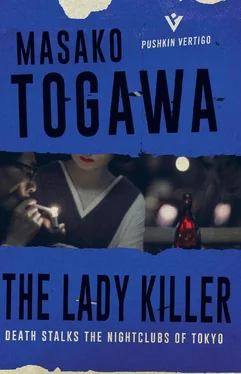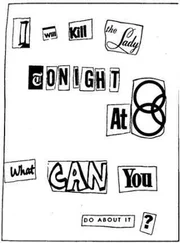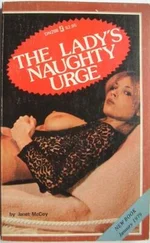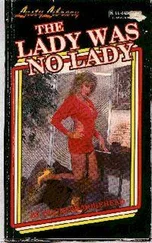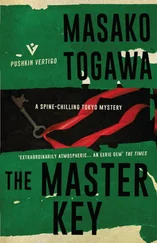“Is Nobu off tonight?” he asked.
“Oh, it’s Nobu you want, is it? Sorry—he’s out with a customer, taking a cup of tea together, if you see what I mean. Well, if you know him, you know how self-centered he is; he’ll do anything, he says, if there’s money in it for him!”
“Really,” said Shinji. “A real pro, you mean?”
The boy giggled, but an epicene little man sitting at the counter next to Shinji turned to him, peered at him through his glasses and lisped, “Oh, my! I’m terribly sorry! Are you interested in Nobu, too? But do be careful—he’s an awful tease, and quite cold-hearted. Why, once he went to a hotel to meet a strange man who phoned in, and the man gave him ten thousand yen, and still Nobu only spent an hour with him!”
“Wow!” said another customer. “What a boy! When was that?” Shinji found this intervention most convenient.
“Six months ago—on his birthday. You know, his best patron came and said, ‘Let’s celebrate in the grand manner. Tonight, everything is on me!’ But as soon as that telephone call came, Nobu just walked out on us. ‘An engagement,’ he said, ‘comes first.’ Even Mama-san was disgusted with him that night! He came back after an hour and said, ‘I had a steak in a hotel restaurant as I dissipated my energy.’ What lies! Everyone knows hotel restaurants aren’t open at that hour. Typical showing off! As if he’d buy a steak—he’s too mean to give anyone even a sheet of tissue paper!”
“Some customer, to give him ten thousand yen. Wish I could find one like that!”
“But he only called the once, you know. Nobu hopes he’ll call again, but he won’t, mark my words. Once is enough with that cow! He’s got no sense of service, that one, which is why all his customers leave him in the end.”
It was Akiko, also known by the diminutive “Attchan,” who was running down his rival behind his back. It appeared to Shinji that Nobu had stolen one of his customers off him. He sat listening to this and similar talk interspersed with suggestive banter between Attchan and the plump, pink customer on his right for thirty minutes, but still there was no sign of Nobu. Perhaps he’d better phone later. He paid his bill, a mere 350 yen for the beer and some tidbits, and left.
But when he got to the bottom of the stairs he found that it was raining outside. In fact, it was a downpour, and he decided to shelter there until it subsided. The water formed deep pools on the asphalt, reflecting the red neon light of the bar sign. He lit a cigarette and gazed at the furious deluge. Not a soul was in sight.
A taxi stopped at the end of the lane, and a man, his jacket pulled over his head, ran to where Shinji was sheltering. He paused under the eaves and put his jacket on; under it was a striped shirt, which revealed that he was a waiter from Bar B. He glanced at Shinji and smiled impishly. His face was feminine, with something of the soft roundness of childhood left in it. And on his tie was the initial N.
“Nobu, I presume,” said Shinji. “I have been waiting for you.”
“Sorry to keep you waiting in this rain. Won’t you come up?”
“No thanks—I spent quite a time there already. I must be on my way now—but just a question or two first.” And taking a thousand-yen note out of his wallet, he folded it with deliberation and slipped it into Nobu’s handkerchief pocket.
“I’m a lawyer,” he went on. “I’m checking into blood donation. Have you given recently?”
“No.”
“Are you sure?”
“Yes. I’ve become anemic of late. Are you looking for AB Rh-negative, then? What sort of operation is it for?”
Shinji just shook his head. His stud card had turned out to be useless after all; it was time for him to fold.
“Anyway,” the young man continued, “I made a pledge at my last birthday that I would never give blood again. I make an important resolution every time I have a birthday. Who knows, next year I may resolve to quit gay bars!”
“And when is your birthday?”
“January fifteenth.”
January 15… the day that Mitsuko Kosugi was murdered. And the boy had said…
“And you said that something interesting happened to you on your birthday. What was it?”
“I didn’t say it.”
“Sorry, Attchan did.”
“Oh. Well, it wasn’t really anything nice—Attchan’s jealous, that’s all. I mean, yes, I was given money, but ooh, what a weird customer! I was called to the hotel by telephone. He made me take a bath, but he didn’t remove a single garment—in fact, he even wore gloves throughout! A short guy, with a muffled sort of voice. And he only left a small bedside footlight on, so it was almost pitch dark. I don’t think it’s so romantic in the dark, do you?”
“And he gave you ten thousand yen?”
“That’s right.”
The rain had subsided; at the far end of the lane, a drunkard staggered along, supported by a harlot. And nobody had taken the boy’s blood after all. So the old man’s efforts—the careful listing of AB Rh-negative donors, his investigations with the blood banks—had been to no avail. His own long hours on the trail had also been useless.
“Thanks,” he said weakly.
“Is that all you want of me?” said Nobu Mikami, winking at him lasciviously and tapping the handkerchief pocket into which Shinji had slipped the thousand yen. “But, between you and me, I think that all men with moles are a bit abnormal, don’t you? My customer tonight had a large mole above his belly button, just where his fat was running to slack. Disgusting, I call it!”
The rain had at last stopped, and Shinji left without a word. But he had only gone a few paces down the narrow street before the significance of the boy’s words struck home. He rushed back and caught Nobu halfway up the stairs.
“You said ‘mole,’” he panted. “Do you mean that the customer on your birthday had a mole, too?”
“Sure—a big one on the base of his nose.” He looked down the stairs at Shinji and laid his finger down one side of his nose suggestively.
“Are you sure the customer was a man? Could it not possibly have been a woman in disguise?”
The boy blinked in surprise at this peculiar question, but at length replied, “I have no idea—could be. I have lots of oddball customers, but it doesn’t worry me so long as they pay. But if it was a woman, I don’t know what on earth she wanted from me.” He turned his back and vanished up the stairs, his full buttocks twinkling under the tight jeans. Shinji stood there in stupefaction. At last it was all becoming clear.
Three out of the five people with that rare blood group had met someone with a mole on the side of his or her nose. But in every case the circumstances had differed. And, even more significant, those three meetings had occurred on the day of one of the murders or on the day before. Three moles on three noses, all connecting up in one line. It hadn’t occurred to him until he had heard the boy’s last words. But who could she be, this woman with a mole on her nose? What was she after? Question after question poured through his mind.
He hurried away from the shady quarter. On the main street, he looked for a public telephone.
7
He went into a coffee shop and used the public telephone to call up the old man at his home, but the maid answered and grumbled that he was not back yet. “And he didn’t even say where he was going,” she complained.
Where could he be, all by himself at this time of night? Shinji decided to wait a while for his return home and took a corner seat and ordered a cup of coffee. A few seats away, an avant-garde group of young people who seemed to be led by a young woman wearing white lipstick were striking extravagant poses and putting white tablets into their beer. Shinji ignored them. Getting his memo book out of his pocket instead, he began to write down his conclusions from his research to date:
Читать дальше
